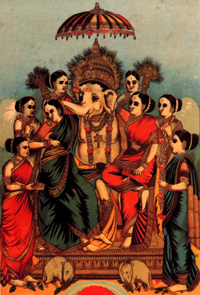Siddhi
[4] Traditional In the Panchatantra, an ancient Indian collection of moral fables, siddhi may be the term for any unusual skill or faculty or capability.
[citation needed] In Patañjali's Yoga Sutras IV.1 it is stated, Janma auṣadhi mantra tapaḥ samādhijāḥ siddhayaḥ, "Accomplishments may be attained through birth, the use of herbs, incantations, self-discipline or samadhi".
[5] Patanjali discusses siddhi in Vibhuti Pada (third chapter) and commentators like Vyasa consider it as a by-product of yogic path due to mastery over prakriti.
[9] In Shaivism, siddhis are defined as "Extraordinary powers of the soul, developed through consistent meditation and often uncomfortable and grueling tapas, or awakened naturally through spiritual maturity and yogic sādhanā.
The last day of Navaratri, the celebration of the pastimes and forms of Goddess Parvati, the wife of Shiva, is for Siddhidhatri, quite literally "She who has the power to grant the Siddhis".
In Tantric Buddhism, siddhi specifically refers to the acquisition of supernatural powers by psychic or magical means or the supposed faculty so acquired.
